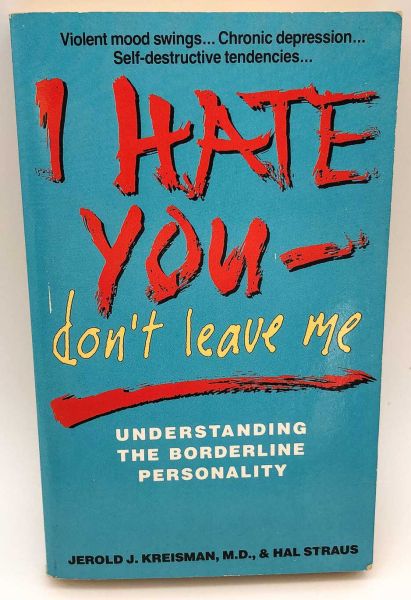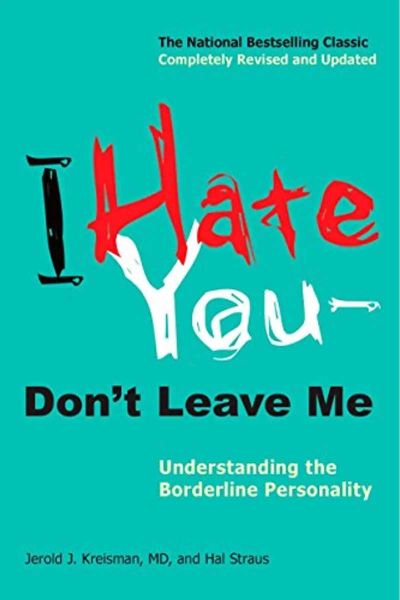Existential Angst-Personal and Political
Existential Angst-Personal and Political
Let's face it. Most people live more or less perennially maxed-out. They have credit-card debt; they don't get enough sleep; they're on the hook to so many other people; so they cannot sleep anyway. The explanation for that kind of behavior? Go for the gusto! Apologize for nothing! Why bother to live, if you don't try to have your cake and eat it, too?
Of course, toting the load gets to be too much. They want to bail out—parachute or no parachute! Clinging to children, girlfriends, and sacks of cash, they want to leap to safety. If they climb up the steep ridge of human experiences, like mountain-climbers, they don't want to fall off accidentally; but they also weary of the mental calisthenics of justifying their presence there. So, just jump off, and get it over with!
I first saw I Hate You! Don't Leave Me! in the office of a family-therapist. The author Dr. Jerold Kreisman and his co-writer Hal Straus set out to describe the mental illness known as Borderline Personality Disorder (BPD) to psycho-therapists, to help the therapists identify BPD symptoms in their patients, and to get them the appropriate meds and therapy.
As I read I Hate You! Don't Leave Me!, however, I thought, "Mental illness?" Hell, everybody has some of this. Obviously, extreme cases of BPD need some attention, but the book really describes a feature of human life that affects us all, Existential Angst—a fancy way of saying that we are alone and need structure, orientation, and limits, even if we deny it. Personal circumstances may drive us closer to the edge, that we have no control over; but with appropriate applications, we can overcome the desperation we feel, and live a happier life.
I am amazed how much Kreisman touches our basic human condition—not just existentially lonely people living on the edge, trapped inside our own skins, but also our political selfhoods, our choice of governments, our ability to prosper in a freedom-loving culture and to utilize the freedoms, lack of stricture, and reliance on personal initiative—personal qualities supposedly unique to Americans. The Framers of the Constitution left us with an unframed existence, and it has a downside.
Kreisman's Americans have little sense of self or constant intentionality—the qualities they need to maintain a freedom-loving society. I excerpt a few quotes here that explain Kreisman's concern:
Page 3: Though (Jennifer) enjoyed being desired, she always felt she was fooling or tricking (boys).
Page 4: Jennifer felt like a child clad in the armor of an adult. . . . She expected (the boys) to see through her disguise.
Page 10: A child emotionally, a borderline cannot tolerate human inconsistency or ambiguity. He cannot reconcile good or bad qualities in a coherent understanding.
Nuances and shadows are grasped with great difficulty.
Page 12: The borderline carries only a sketchy map of interpersonal relationships.
He finds it difficult to gauge the optimal psychic distance from others. To compensate, he caroms back and forth, from clingy dependency to angry manipulation.
Kreisman writes that people who exhibit borderline behavior do not function well in a freedom-loving society. They want to submit to authoritarian leaders and, conversely, assert authority over others, diminishing the ability of the society to remain free and mobile. These facts have political ramifications as well as personal:
Page 10: The borderline is typically attracted to (complementary) others. The domineering, narcissistic personality of "Jennifer's" husband . . . was able to give her an identity.
Page 13: Researchers believe that as many men fulfill borderline criteria as women, but . . . men act out violently against the world.
Page 26: Because borderlines yearn for direction and acceptance, they may be attracted to strong leaders of disciplined groups. The cult can be very enticing. . . .
The borderline is vulnerable to a black-and-white world-view.
Page 27: In relationships, the intenal feelings translate to shifting, manipulative couplings. The borderline makes unrealistic demands of others, appearing spoiled to observers.
Page 28: Though sensitive to others' (criticisms), the borderline lacks true empathy.
A constant, predictable perception of another person never emerges.
Page 29: A borderline cannot gain enough independence to be dependent in healthy, rather than desperate ways. True sharing is sacrificed to demanding dependence.
Page 71: Increased freedom and lack of structure paradoxically imprison the borderline, who is handicapped in devising his own individual system of values.
Page 75: James Masterson notes that governments with extensive social welfare systems . . . promote social dependency, discourage autonomy, and increase borderline and sociopathic behaviors.
Kreisman writes that problems in brain chemistry or infant-stage orientation may hinder the brain's ability to create the individual ego. Not only can the borderline not achieve an independent sense of self, he cannot develop a perspective about himself. He cannot learn from experience, so he makes the same mistakes again and again. To think that memory-power depends on ego-strength.
Page 30: The borderline is in the position of "living in the now." Octavio Paz calls it "an endless instant."
A borderline's limited patience and need for immediate gratification may be connected to drug and alcohol abuse (to) serves as a defense against loneliness.
Page 55: (from Marilyn, by Norman Mailer) "Great actors usually discover they have a talent by first searching in desperation for identity. . . . The force that propels a great actor is insane ambition, illegitimacy, and insanity."
Page 56: (Marilyn continued) "A housemother for ten orphans? . . . The real horror is that the child loses all sense of inhabiting even its own body."
Page 123: "Transference" refers to the patient's projection onto the therapist, of feelings and attitudes previously experienced from other important persons.
Page 127: Transference is the projection of past emotions onto current objects.
Some of the on-line reviews of I Hate You! Don't Leave Me! just seethed with anger at Kreisman for his insensitivity and sexism. His book does take a sober, uncompromising stance, but he did not write it for the general public. The latter-half of it deals almost entirely with the various treatment options for the benefit of doctors and therapists.
Stung by the negative reviews, however, Kreisman rewrote much of the text of I Hate You! for its second edition, to tone it down. I advise my readers to avoid the second edition and stick with the first. Kreisman obviously had no idea that his frankness would outrage so many people, but he also did not figure on the book appealling so much to the general public.



